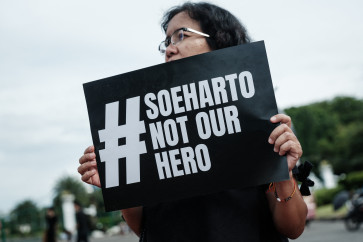Popular Reads
Top Results
Can't find what you're looking for?
View all search resultsPopular Reads
Top Results
Can't find what you're looking for?
View all search results‘In the Name of Belief’: RI embraces indigenous religious education
Sweet, sweet smile: A follower of the Marapu indigenous faith in Sumba, East Nusa Tenggara, appears in Atas Nama Percaya (In the Name of Belief)
Change text size
Gift Premium Articles
to Anyone
S
span class="caption">Sweet, sweet smile: A follower of the Marapu indigenous faith in Sumba, East Nusa Tenggara, appears in Atas Nama Percaya (In the Name of Belief). The 2019 documentary, which premiered in Jakarta on Nov. 30, traces the history of religious restrictions in Indonesia.(Courtesy of Atas Nama Percaya (In the Name of Belief)/Indonesian Pluralities)
“In the name of the Father, the Son and the Holy Spirit. Amen.”
This was the phrase that Retno Lastani uttered as she made the sign of the cross decades ago, when she took Catholicism as a school subject. What she had never uttered, especially in front of her friends, was the fact that she was not Catholic.
Retno is an adherent to Kapribaden, an indigenous faith and one of the 188 indigenous registered faiths in Indonesia, although experts say the real figure is larger. It was her biggest secret, and she was afraid it would drive her friends away if they knew this about her.
“I had to choose a religion at school, while at home I followed [my] indigenous faith. I felt alone, as my friends didn’t know that I followed an indigenous faith, so I had this unsettling feeling in my heart and I didn’t know who I really was,” she told The Jakarta Post on Tuesday.
Prior to 2016, students who followed indigenous faiths generally had no choice but to choose their religion class from one of the six recognized state religions: Islam, Protestantism, Catholicism, Hinduism, Buddhism and
Confucianism.
This changed in 2016, when the Education and Culture Ministry issued a regulation on indigenous faith education, which required schools to provide registered indigenous faiths as a religion class option. But instead of certified teachers, these classes are provided by “instructors”: followers of the indigenous faith who taught the class under a volunteer scheme.
Today, Retno is one of the 254 indigenous faith instructors who have been assessed by the Majelis Luhur Kepercayaan Indonesia (MLKI), an organization that groups the followers of Indonesia’s indigenous belief systems.
According to the Education and Culture Ministry, Indonesia currently has 2,433 students who are registered as indigenous faith followers.
Although the instructors do not get paid and, more often than not, schools allow them to hold their classes in their own communities outside school hours, Retno said she was simply glad that followers of indigenous faiths could practice their faith freely and pass it down to their children.
“It is a challenge for us to explain our faith to our children. We need to preserve these faiths and increase our children’s confidence that their faith isn’t strange,” said Retno. “Children think that following [an indigenous] faith makes them part of the minority, like I did, so we need to motivate them through education that they have been given better acknowledgment [of their chosen faith] than their parents had.”
Indonesia’s indigenous faith followers have experienced fluctuating government recognition, as seen in Atas Nama Percaya (In the Name of Belief), a 2019 documentary film that premiered at a special screening in Jakarta on Nov. 30 to an audience comprising teachers, indigenous faith followers and the general public.
The film is produced by Indonesian Pluralities, a collaborative project that involves the Center for Religious and Cross-Cultural Studies (CRCS) of Yogyakarta’s Gadjah Mada University (UGM), the Frederick S. Pardee School of Global Affairs at Boston University and the WatchdoC Documentary production house.
The documentary features two indigenous Indonesian faiths, the Aliran Kebatinan Perjalanan (AKP) of Subang, West Java, and the Marapu faith of Sumba, East Nusa Tenggara. The film traces the history of discrimination their followers have experienced since the end of the administration of Sukarno, Indonesia’s first president, through the escalated discrimination under Soeharto’s authoritarian New Order.
The film reveals, for instance, that the 1965 Blasphemy Law implies that indigenous faiths are disruptive to public order. It also shows that indigenous faith followers were intimidated and even persecuted following the Sept. 30, 1965 tragedy, accused of being communists, anti-religion and atheists. To free themselves of the sociopolitical stigmatization, indigenous faith followers affiliated with one of the recognized state religions.
The 1973 Temporary People’s Consultative Assembly Decree (TAP MPRS) declared religious equality and recognition for indigenous faiths, but another TAP MPR issued in 1978 annulled this.
In 1980, the government required all citizens to supply one of the state religions in the Religion field of their identity cards (KTPs). Failing to do so meant the non-issuance of the KTP, which was required to access public services.
The condition gradually improved with the enactment of the 2006 Population Administration Law, which allowed Indonesian citizens to leave the Religion field blank. In 2017, the Constitutional Court ruled the law as discriminatory and unconstitutional, and issued a decision stating that followers of indigenous faiths had the right to specify their chosen faith or belief system on their KTPs.
As of February 2019, six regional administrations have been issuing KTPs with a “Faith” field to followers of indigenous faiths: Semarang, Tegal, Blora, Jepara and Cilacap in Central Java, and Bandung in West Java.
“Religious affiliation has always been a political construct and the result of a political process that has become an entrenched mindset,” CRCS lecturer Samsul Maarif said during the post-screening discussion.
“Religion is defined as an unquestionable belief, and this view continues to be perpetuated. We [need to] transform in the name of diversity and the equal rights of [all] citizens,” he said.
Following the 2017 Constitutional Court decision, the film shows many AKP followers filling the Religion field with “Faith in One God” and several Marapu followers retaining Protestant or Catholic on their KTPs, fearing that they would lose access to public services if they supplied their true faith.
The followers of both faiths, however, pursue the aim of maintaining their faiths for the generations to come.
Marapu followers require at least one child in every family to keep to their indigenous faith, while both Marapu and AKP followers continue to advocate for indigenous faith education in schools.
Andri Hernandi, the head of the AKP central deliberation board and an MLKI executive, said during the post-screening event that indigenous faith organizations in the country had come together to discuss the curriculum and textbooks for indigenous faith classes.
The curriculum would be comprised of universal teachings that applied to all indigenous faiths, including the concept of “the Oneness of God”, their history and character building, as well as faith-related prohibitions and obligations.
Andri also welcomed the move of 17 Agustus 1945 University of Semarang (UNTAG Semarang) in Central Java to offer a new major in indigenous faith education, the first in Indonesia.
“The major will produce teachers [for indigenous faith classes],” he said.
Separately, education ministry spokesperson Ade Erlangga Masdiana said that the first batch of indigenous faith textbooks were being published and would be ready by 2020.










